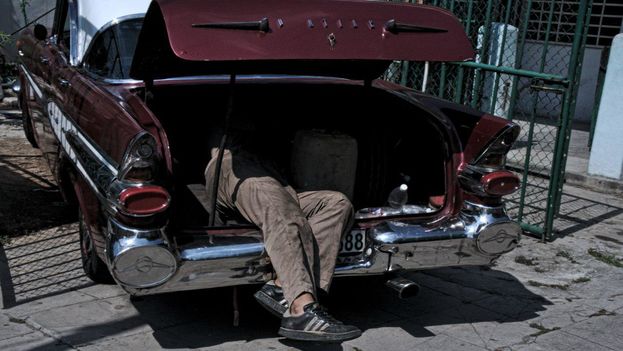
![]() 14ymedio, Marcelo Hernandez, Havana, 7 August 2017 — The new measures to regulate the private sector are arriving drop by drop, with last Saturday’s announcement affecting taxi service, calling for the creation of piqueras – taxi stands/stops – fixed itineraries and prices of five pesos for each stretch of 8 kilometers.
14ymedio, Marcelo Hernandez, Havana, 7 August 2017 — The new measures to regulate the private sector are arriving drop by drop, with last Saturday’s announcement affecting taxi service, calling for the creation of piqueras – taxi stands/stops – fixed itineraries and prices of five pesos for each stretch of 8 kilometers.
According to the Deputy Minister of Transportation, Marta Oramas Rivero, this initiative is intended to “bring order” to the services offered by the almendrones – the classic American cars used in shared fixed-route taxi services. Saturday’s midday television news announced new regulations for private passenger transport in Havana.
“The price of the total route is the sum of these segments,” Oramas said, who also detailed that the new program could be voluntarily taken advantage of by the “private carriers who decide to do so.” However, the announcement has begun to generate suspicion in a sector that, in recent months, has experienced an increase in controls and requirements.
Last February, the government imposed prices on the 7,100 almendrones in the capital. From the time licenses were first issued for this service in the 1990s and up until now, rates have been governed by the law of supply and demand.
In response to the already imposed regulations, many drivers eliminated intermediate stops and opted only to carry passengers traveling their complete route, a situation that contributed to further complicating transportation in the country’s most populous city.
The new piqueras, which will come into operation “soon,” will be operated “by a state entity and not by a cooperative,” clarified Oramas.
Carriers, however, still lack the necessary information, since it has been explained that those who join the initiative must “establish contractual relations” with the state entity in charge but it is unknown who will manage the piqueras.
“After working for a decade in [state-owned] Taxis-Cuba, I decided to make a living with my own car,” says Walfrido, 38, a regular at Fraternity Park, where he picks up most of his passengers. “If the piqueras are going to be administered by this [new] company I won’t join because it is very inefficient.”
Walfrido fears that “they are going to start organizing the stops and end up telling you where the car has to go.” During his years as a taxi driver in a state entity he often had to “stop picking up customers to transport guests from the government, people who were going to some activity or officials,” he recalls.
Without an independent union to represent them, the chances of the drivers putting pressure on the Government are minimal. However, with the strength that they do have, they have the ability to shut down circulation in the cities.
The vice minister defines it as an advantage that those who are part of the experiment will be able to access the sale of fuel in the wholesale market at a different price, and will be able to purchase of “parts and pieces,” according to availability, to enable them to keep their cars running.
The promise to obtain gasoline or diesel at a lower cost than in state-owned service centers could be a good stimulus if it were not for the fact that many of the owners of these vehicles are now being supplied in the “informal” market. The diversion* of fuel from the state sector maintains an illegal stable supply at prices ranging from 10 to 15 CUP per liter (roughly equivalent to $1.50 to $2.25 US per gallon).
Some welcome the possibility of buying discounted parts. “If they are going to stock the stores I am interested, but as it is right now there is very little to reduce [prices on],” says Rodobaldo, a driver who serves the route to La Lisa. “The month it takes me to buy a light to replace a broken one, that month I am ruined,” he says. “So if they lower prices and have the supply,” it would be welcome.
Each botero – or “boatman,” as the drivers are called – will be able to decide which route to work and “will be guaranteed the exclusivity of the service” offered on that route, said Marta Oramas Rivero, so that “only those designated to work on it” will be able to serve it.
The cars associated with the experiment will be marked with stickers showing their itinerary and the piquera they operate from, while those who do not join the experiment will be identified with a mark that indicates that it is a ‘free’ taxi.
But there are still more questions than answers. “They have not clarified whether the partners [in the scheme] will pay reduced taxes, who will pay the salaries of state employees who will work at the piqueras or if the government will control the expense of that fuel at a lower price according to the kilometers traveled,” says Walfrido.
“This experiment is green, green. It is going to fail and end up affecting a lot of people,” he laments.
*Translator’s note: “Diversion from the state sector” means, in Cuba, all the myriad ways workers, managers and officials steal from the state. Without this “diversion” across a wide range of resources and across the entire country, the Cuban economy would come to a standstill.
